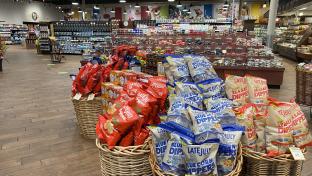'Alternative' Better-For-You Snacks Make Impact In Grocery
Consumers want a lot from their snacks. They want a steady stream of new flavors to keep them engaged, and increasingly, they want more nutritionally dense versions of traditional chips, pretzels and puffs. Manufacturers have been happy to comply with a slew of “alternative” better-for-you snacks in a variety of new flavors.
Plant-based snacks are a significant source of growth in the category and, while they still represent a small percentage of overall category sales, growth in the segment is outpacing traditional snacks.
“According to the FMI/The Hartman Group’s ‘U.S. Grocery Shopper Trends COVID-19 Tracker’ report, 44% of consumers say they are eating healthier during the pandemic,” says Rhasheda Boyd, senior marketing director at PopCorners, which markets that brand as well as soybean and cassava-based Flex Protein Crisps and Flourish Veggie Crisps gluten-free air-popped snacks. “Moreover, The Hartman Group’s recent ‘Snacking: Emerging, Evolving and Disrupted’ report indicates that 48% of all food and beverage occasions are snacking occasions. This tells us that the better-for-you snack category is here to stay and is only increasing in demand.”
Category giant PepsiCo, which has already acquired PopCorners as well as Bare Snacks, maker of baked fruit and veggie chips, recently revealed a joint venture with El Segundo, Calif.-based meat-substitute manufacturer Beyond Meat Inc., a move that will likely lead to even more action in the segment.
“Now more than ever, consumers are looking for more nutritious, environmentally conscious products and increasingly turning to plant-based protein — a trend that we believe will only grow in the coming years,” says a representative of Purchase, N.Y.-based PepsiCo.
“The plant-based market trend is on fire,” affirms Deb Holt, chief marketing officer at Fairfield, N.J.-based Real Food From The Ground Up. “Snacking, already a rapidly increasing behavior, has only accelerated as consumers spend more time at home. With more mindful snacking happening at home, consumers are paying closer attention to the snacks they are eating.”
Real Food From the Ground Up, which makes cauliflower-based swaps for pretzels, tortilla chips and puffs, recently expanded distribution of its cauliflower-based versions of the classic potato chip, now available in four flavors. Later in 2021, the company will also launch a Cauliflower Snacking Cracker and a Purple Carrot Cracker. “We’ll keep innovating until there’s a plant-based cauliflower snack offering for each salty snack subcategory,” says Holt.
“People have been turned off by starches, and that behavior is not changing,” observes Steve Kneepkens, SVP of sales and marketing at Fairfield, Calif.-based Calbee North America, maker of the Harvest Snaps brand. He anticipates higher sales for plant-based snacks over the next five years.
Harvest Snaps snack crisps, made from green peas, red lentils and black beans, are delivering a nutrient-dense, crunchy chip option for consumers avoiding starches. This May, the brand is launching an almond-based tortilla chip featuring a blend of almond and cassava flours for a more nutritious chip.
Cassava root is also the base ingredient for Plant Snacks products. Dave Eisen, CEO of Boston-based Plant Snacks, believes consumers are looking for a reason to try something new, and Plant Snacks products, which are grain- and gluten-free, check the right boxes for consumers.
“What a product contains is just as important as what it doesn’t contain,” says Eisen. Available in a variety of vegan flavors, such as beet with vegan goat cheese, and vegan cheddar, the brand recently launched a larger 8-ounce-size version of its sea salt-flavored chip.
Younger consumers in particular are tuned into products that are also good for the environment. “Our chips were born from the idea that you can have still enjoy healthy snacking with reimagined vegetable chips, and be kind to yourself and the planet while enjoying them,” notes Stephen Williamson, CEO and founder of San Francisco-based Forager Project, maker of such plant based-snacks as Super Greens (kale and spinach blended with ancient grains) and new Cassava Cashew chips.
Beyond Plant-Based
Protein- and cheese-based items are also growth segments. “We’re seeing shoppers looking for new options that provide the same flavor, comfort and nostalgia as snack favorites like chips and crackers,” says Allison Schuman, SVP of sales at New York-based Whisps. “We’re going to continue to see brands reimagine these flavors with premium spices and other natural ingredients to deliver the same taste in a cleaner format. Whisps meets their needs with a nutrient-dense, single-ingredient option, [featuring] 100% artisan cheeses exclusively made for the brand.”
The brand recently launched three new chip-inspired flavors and is currently rolling out a Garlic Herb flavor. “We are also exploring fun brand moments, such as the Valentine’s Day pack of single-serve Whisps pouches, cheesy stickers and cards,” adds Schuman. “We’re exploring how our brand can show up during other holidays as a snack and activity as well.”
Protein-enhanced options are also on the rise. “A recent report from The Hartman Group says that 60% of consumers are adding or increasing protein in their diet, and 36% of consumers indicated that they are adding more plant-based proteins to their diet,” says PopCorners’ Boyd. “This is exciting for [the] Flex brand, which contains 10 grams of protein in every serving.”
Linda Zink, chief marketing officer of El Segundo, Calif.-based Quest Nutrition, believes that the quality of protein is also important to consumers. “We provide consumers with a complete protein for a full amino acid profile, and we use ingredients that have metabolic advantages,” she explains. “We will continue to see this category grow, and as consumers continue to get smarter about snacking, these attributes will become even more important.” The brand recently introduced a Spicy Sweet Chili flavor.
Taste Still Drives Choice
Meanwhile, Boston-based Biena Snacks recently launched Keto Puffs, a snack with a texture similar to a cheese puff, but with a lower carb count and higher protein content.
Understanding that consumers will never sacrifice taste for a healthy halo, manufacturers are offering both attributes to consumers and are tempting them to expand their snack horizons with new flavor profiles.
“Today, consumers expect their better-for-you snacks to achieve delicious taste, real food ingredients and nutrition,” says Poorvi Patodia, CEO and founder of Biena Snacks, maker of roasted chickpeas and chickpea puffs.
“There’s been a major shift in global flavors to African- and Asian-influenced flavors,” notes Kneepkens. “Peanut-based products are an easy way for consumers to add protein. With a shift to snacking as meal replacement, we’re seeing more meal-flavored products, like Turkey Dinner or California Roll.”
Sweet-and-salty combinations are also becoming more common. Frito-Lay’s Do Us a Flavor competition has spawned Cotton Candy and Dill Pickle versions of the classic chip, and alt snacks are following the company’s lead: For instance, Harvest Snaps introduced a Cinnamon Sugar Pea Snap and is working on some new flavors for 2021.
Some alternative snack companies are tailoring their assortment for their retail partners. Plant Snacks launched this fall in Bentonville, Ark.-based Walmart and Austin, Texas-based Whole Foods Market with different flavor profile programs, since the Walmart customer tends to be less experimental with new flavors. “We’re executing our program in different ways for different retailers, and we’ve been successful in different parts of the store,” says Eisen. “A number of retailers, such as Publix, have introduced mindful snacking sets. We also like to be in the main snack aisle as a better-for-you adjacency.”
For her part, Quest Nutrition’s Zink would like to see a low-carb lifestyle section in retail. “As consumers become increasingly aware about carbs and sugar and want to make smarter choices, bringing these brands and product offerings together in a designated space will only bolster their performance and promote trial and awareness, while creating a more convenient shopping experience,” she observes.
Outposting Boosts Sales
While most alt snack brands are happy to have placement in gluten-free sets or on the perimeter of the store, most agree that the best place for these brands is in the mainstream snack aisle. “A gluten-free set is always a good idea, but the snack category should be wide open for anybody to shop,” says Kneepkens. Rochester, N.Y.-based Wegmans Food Markets, for example, merchandises gluten-free snacks in a dedicated aisle, but merchandises plant-based better-for-you snacks in its main aisle and calls out specific product attributes, such as vegan, in sections within the snack set.
Secondary merchandising options are hugely important to this growing category. “Snacking items are often an impulse purchase, so having end caps and shippers throughout the store helps to drive awareness and purchase,” advises Forager Project’s Williamson. “Kroger does a great job at expanding their offerings as well as implementing a national shipper program to capture the impulse/convenient purchases throughout the store.”
Plant Snacks is working with Wegmans on a pallet program and its shipper program with West Des Moines, Iowa-based Hy-Vee has delivered great results, according to Eisen. “A presence on the perimeter of the store can be a great volume and awareness driver for customers who are looking for something new,” he says.
Nontraditional snack products are finding homes in a variety of locations in the store. While Harvest Snaps is currently merchandised in the produce aisle, Kneepkens is looking at merchandising opportunities in the snack aisle as well as in the deli with a shipper program. Whisps started as a deli brand and has performed well when merchandised over the deli case or salad bars. The brand’s growth has propelled it into additional locations throughout the store, including the cookie/cracker aisle, where it outperforms some well-established heritage cheese snacks, according to Schuman.
While traditional snack products still drive a hefty percentage of category sales, new products offer the variety that consumers crave, appeal to younger shoppers and lift category sales overall. As Zink notes, “In launching our chips, we learned that merchandising drove not only incremental volume to our brand, it drove impactful sales that were incremental to the whole category.”





